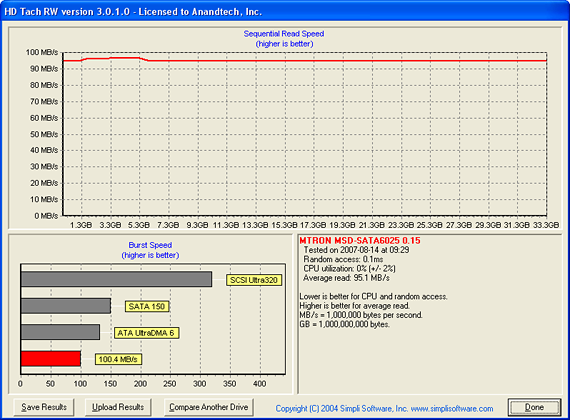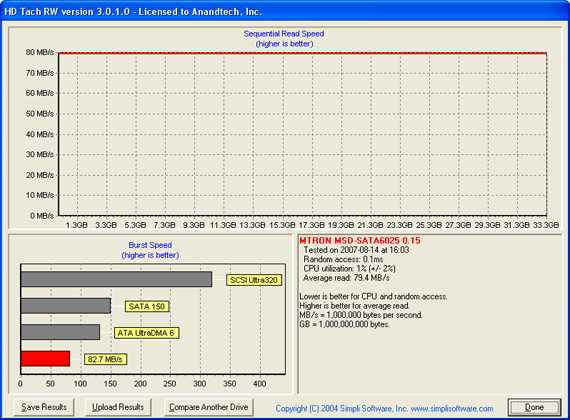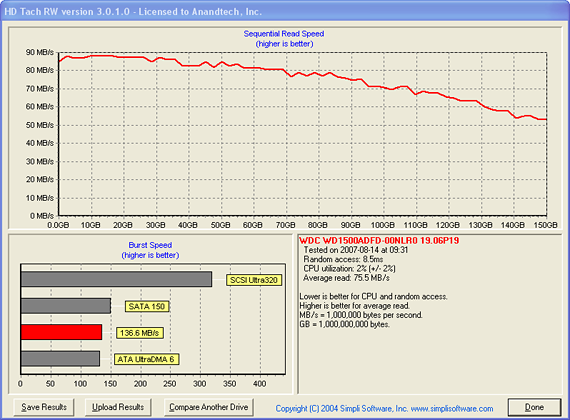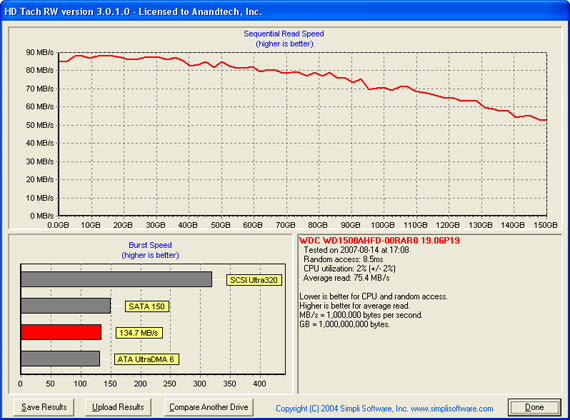MTRON SSD 32GB: Wile E. Coyote or Road Runner?
by Gary Key on August 15, 2007 3:00 AM EST- Posted in
- Storage
HD Tach 3.0
MTRON 32GB SSD NV680i
MTRON 32GB SSD Intel ICH9R
Our first screenshot is the MTRON drive installed on the NVIDIA 680i controller chipset and indicates a sustained transfer rate of 95.1 MB/sec with a burst rate of 100.4 MB/sec. The same drive on the Intel ICH9R scores a sustained transfer rate of 79.4 MB/sec with a burst rate of 82.7 MB/sec. The Intel controller is up to 17% slower with the MTRON SSD drive in this particular benchmark.
We tried several different P35 boards equipped with the ICH9R and a couple of P965 boards with the ICH8R and had the same results where our SSD drives topped out around 80 MB/sec with these particular Intel Southbridge designs. This occurred under Windows XP and Vista with a variety of Intel INF revisions. Our NVIDIA based 680i and 650i boards did not exhibit this particular issue under either operating system.
The MTRON drive features an outstanding access time of 0.1ms or lower which greatly assists in random read times. The lack of higher sustained or maximum transfer rates on the Intel chipsets will adversely affect the drives performance in most of our benchmarks but we must temper our performance expectations as you will see shortly. In the synthetic benchmarks we will find wide disparities in certain tests, but in our actual application tests the differences were rather minimal in most cases.
WD Raptor 150GB NV680i
WD Raptor 150GB Intel ICH9R
We are also including HD Tach results for the WD Raptor 150GB drive for comparison. The differences between the two controller chipsets are extremely minor with this drive and other mechanical drives we have tested to date. The Raptor's sustained transfer rate of 75.5 MB/sec is around 21% lower than the MTRON SSD drive on the NVIDIA controller and about 5% lower on the Intel chipset. The burst rates of the Raptor are about 36% higher than the MTRON unit.
MTRON 32GB SSD NV680i
 |
| Click to enlarge |
MTRON 32GB SSD Intel ICH9R
 |
| Click to enlarge |
Our first screenshot is the MTRON drive installed on the NVIDIA 680i controller chipset and indicates a sustained transfer rate of 95.1 MB/sec with a burst rate of 100.4 MB/sec. The same drive on the Intel ICH9R scores a sustained transfer rate of 79.4 MB/sec with a burst rate of 82.7 MB/sec. The Intel controller is up to 17% slower with the MTRON SSD drive in this particular benchmark.
We tried several different P35 boards equipped with the ICH9R and a couple of P965 boards with the ICH8R and had the same results where our SSD drives topped out around 80 MB/sec with these particular Intel Southbridge designs. This occurred under Windows XP and Vista with a variety of Intel INF revisions. Our NVIDIA based 680i and 650i boards did not exhibit this particular issue under either operating system.
The MTRON drive features an outstanding access time of 0.1ms or lower which greatly assists in random read times. The lack of higher sustained or maximum transfer rates on the Intel chipsets will adversely affect the drives performance in most of our benchmarks but we must temper our performance expectations as you will see shortly. In the synthetic benchmarks we will find wide disparities in certain tests, but in our actual application tests the differences were rather minimal in most cases.
WD Raptor 150GB NV680i
 |
| Click to enlarge |
WD Raptor 150GB Intel ICH9R
 |
| Click to enlarge |
We are also including HD Tach results for the WD Raptor 150GB drive for comparison. The differences between the two controller chipsets are extremely minor with this drive and other mechanical drives we have tested to date. The Raptor's sustained transfer rate of 75.5 MB/sec is around 21% lower than the MTRON SSD drive on the NVIDIA controller and about 5% lower on the Intel chipset. The burst rates of the Raptor are about 36% higher than the MTRON unit.










37 Comments
View All Comments
iwodo - Wednesday, August 15, 2007 - link
With 40% price decrease per year as well as improve in transfer speed. It will only take 2-3 years before the drive become affordable.But i keep on wondering. Let say I need 10GB for OS. 10GB for Application. I still have 12GB for Swap Space and other uses. 32GB for basic usage is actually more then enough if we dont store any Music or Video.
Personally i would like to see Normal Hard Drive gets much bigger Capacity ( 2 - 4 TB Per Hard Drive ) and move them out of the Main Box to external storage via eSATA. While the Main performance Hard drive will be a SSD based Hard Drive.
wordsworm - Wednesday, August 15, 2007 - link
Boo!johnsonx - Wednesday, August 15, 2007 - link
it's a hard drive test, what difference does it make what CPU brand they use?wordsworm - Thursday, August 16, 2007 - link
Did you read the article? It mentioned how much faster it works on the Nvidia chipset than the Intel chipset. What about an AMD chipset? What difference would that make? You don't think this would make a difference after reading the article?shabby - Saturday, August 18, 2007 - link
You're right, with the amd chipset it would probably be 50% slower... good thing anandtech didnt waste their time testing on amd ;)Bladen - Wednesday, August 15, 2007 - link
Has any reputable site ever done RAID 0 tests with a pair (or more) of SSD's?AnnihilatorX - Wednesday, August 15, 2007 - link
Well http://www.tomshardware.com/2007/08/13/flash_based...">Toms Hardware had done a review including RAID 0 on SanDisk's 32GB SSDjohnsonx - Wednesday, August 15, 2007 - link
yes, but he asked for a reputable sitejohnsonx - Wednesday, August 15, 2007 - link
bad johnsonx, bad!Axbattler - Wednesday, August 15, 2007 - link
I agree that it will remain a niche market product, but I reckon that the main reason will be cost per GB. I wonder if the average consumer's space requirement has exploded much past the requirement added by Vista: how many really rip audio/video to their HD?
Granted, I am a space hog, and I happen to rip at least my CDs to lossless - but I do not know many (outside enthusiast forums) who do that. From a performance enthusiast point of view, especially those who will afford the 'best', I reckon that SSD may overtake the Raptor as the choice for OS drive within the next three years. Those users could always grab one or more TB size HD for their multimedia needs. From a silent PC enthusiast point of view, going by this review, SSD is a non brainer - the more dedicated silencers are already using 2.5" drive in their desktop.